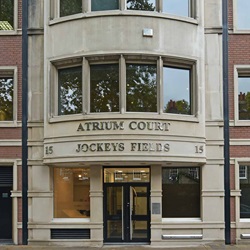
Jockey’s Fields annex: Occupied by the whole chambers, says tribunal
A leading tax law chambers has failed to convince a tribunal that rooms occupied by barristers are individual properties for the purposes of business rates.
Had Pump Court Tax Chambers succeeded in its appeal against a decision of the Valuation Tribunal, each of the barristers would have been able to claim small business rate relief.
Martin Rodger KC, deputy president of the Upper Tribunal (Lands Chamber), and surveyor member Mark Higgin noted that, despite the long history of barristers gathering in chambers, the point appeared a novel one.
Pump Court is based at 15-17 Bedford Row but the dispute focused on an annex on two floors of a neighbouring building in Jockey’s Fields.
With effect from 1 April 2017, this was listed as a single ‘hereditament’ – a unit of property for rating purposes – with a rateable value of £152,000.
Pump Court proposed that each of the rooms occupied by individual barristers be listed as a separate hereditament.
The tribunal noted that, under the current regime of small business rate relief, a ratepayer occupying only one hereditament the rateable value of which is not more than £12,000 will receive a 100% reduction in their rates bill.
“That provides an incentive to split a larger hereditament into smaller units where the characteristics of the premises permit it.”
However, the valuation officer did not support the proposal and last year, the president of the Valuation Tribunal agreed that the premises should remain as one hereditament.
On appeal, it was agreed that each of the rooms was sufficiently identifiable as a unit of property to be capable in law of forming a separate hereditament. The appeal turned on the identity of the person who, in law, was the occupier of the rooms.
There was also a reception area on the same floor, while the basement – held under a separate lease – comprised a seminar room, an ancillary administration room and a room allocated for pupils.
As of 2017, barristers paid chambers between £6,000 and £19,200 a year for their rooms, depending on size. All other expenses were charged as a percentage of their receipts from work done while a member, subject to a cap set annually.
Pump Court argued that, while chambers as a whole occupied the common parts, each member was the only person in occupation of their own room.
This was on the basis that, among other features, each member had exclusive occupation and use of their room; could not be required to move, share it or give it up; occupied their rooms for the purposes of their respective businesses; and faced no controls over what use they made of their rooms, including how they were decorated.
But the tribunal said these features were “equally consistent with occupation being retained by members collectively” and simply reflected “the mode of occupation appropriate to this particular use”.
It said the list omitted the fact that all members were bound together in a contractual relationship, through their subscription to the chambers’ constitution.
Amongst the rights they enjoyed under this was “an equitable interest under the trust of land in which the leases of the appeal property are held pursuant to clause 46 of the constitution which provides expressly that property acquired for chambers is to be held on trust for all members”.
The purpose for which the premises were occupied was “a shared purpose of all members, namely to enable each of them to carry on their individual practices from the same premises and under their collective identity, and to benefit from the joint provision of support and administrative services and the sharing of expenses”, the tribunal went on.
There were also “conventions and understandings” about how chambers’ premises would be occupied but these could be overridden, such as with chambers’ policies around parental leave and part-time working.
“They may also be adapted or departed from where it becomes expedient to do so, such as when new members are recruited on the understanding that they will be required to share for a time, or members wishing to work from home choose not to have a room of their own but decide they will share.”
These were not, as Pump Court argued, exceptions that proved the rule, the tribunal said.
“On the contrary, they are consistent with the absence from the constitution of any restriction on the control of accommodation and are examples of the power of members acting jointly, or by delegation, to allocate the use of space in whatever manner is considered to be most convenient.
“They are a reflection of the collective control which chambers has over its premises and which it has not parted with to individual members.”
The tribunal concluded that individual members of chambers were not in rateable occupation of their separate rooms “because the whole of the appeal premises are in the joint occupation of all members”.














Leave a Comment